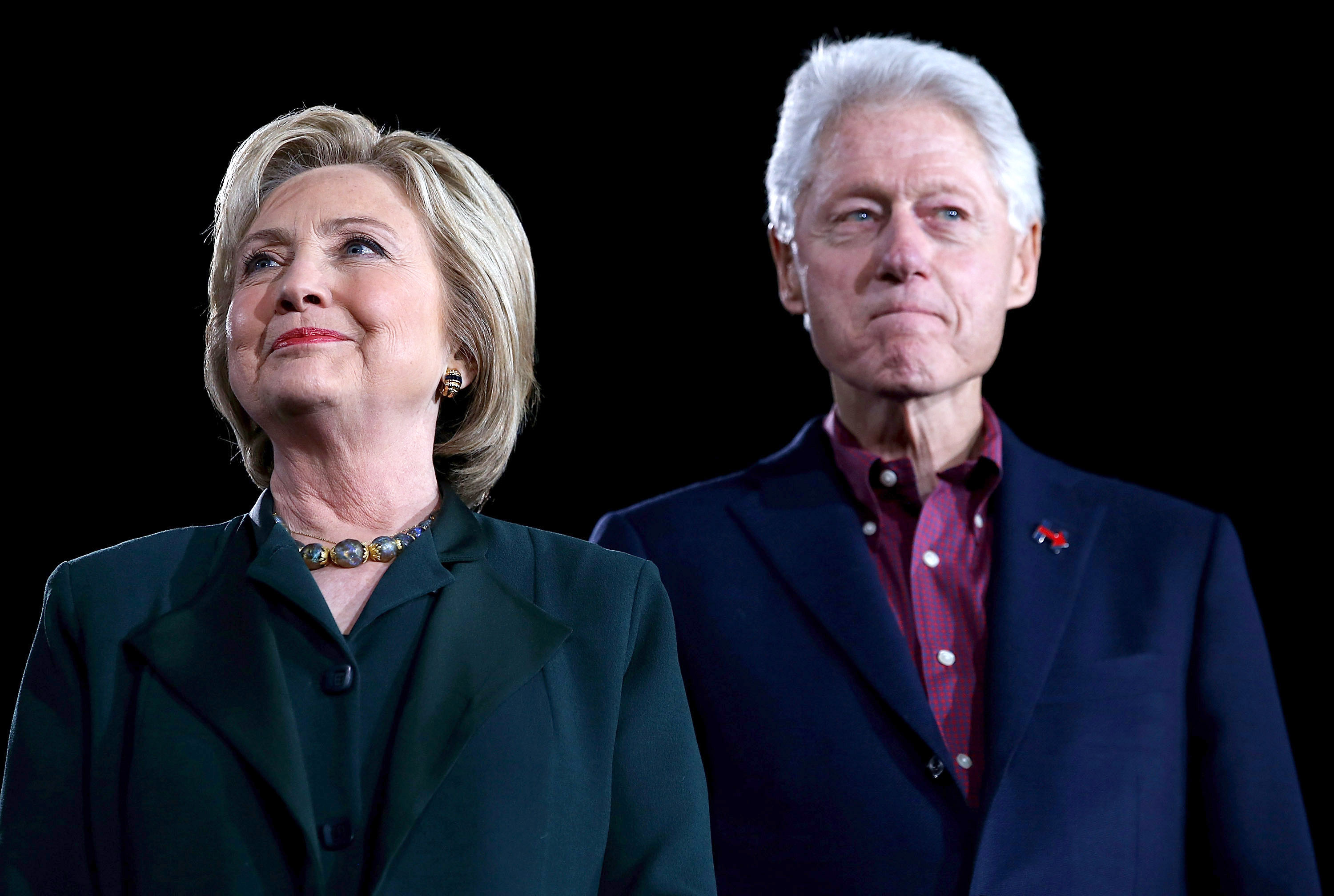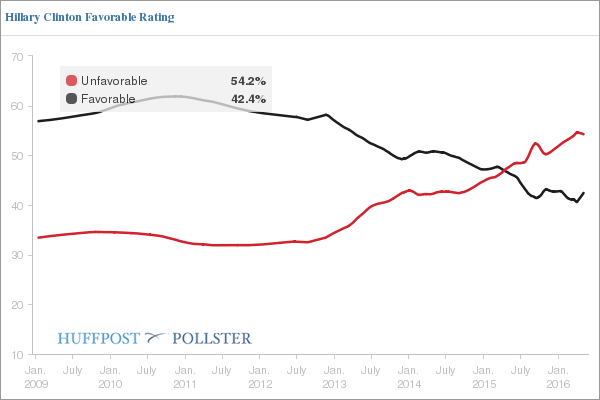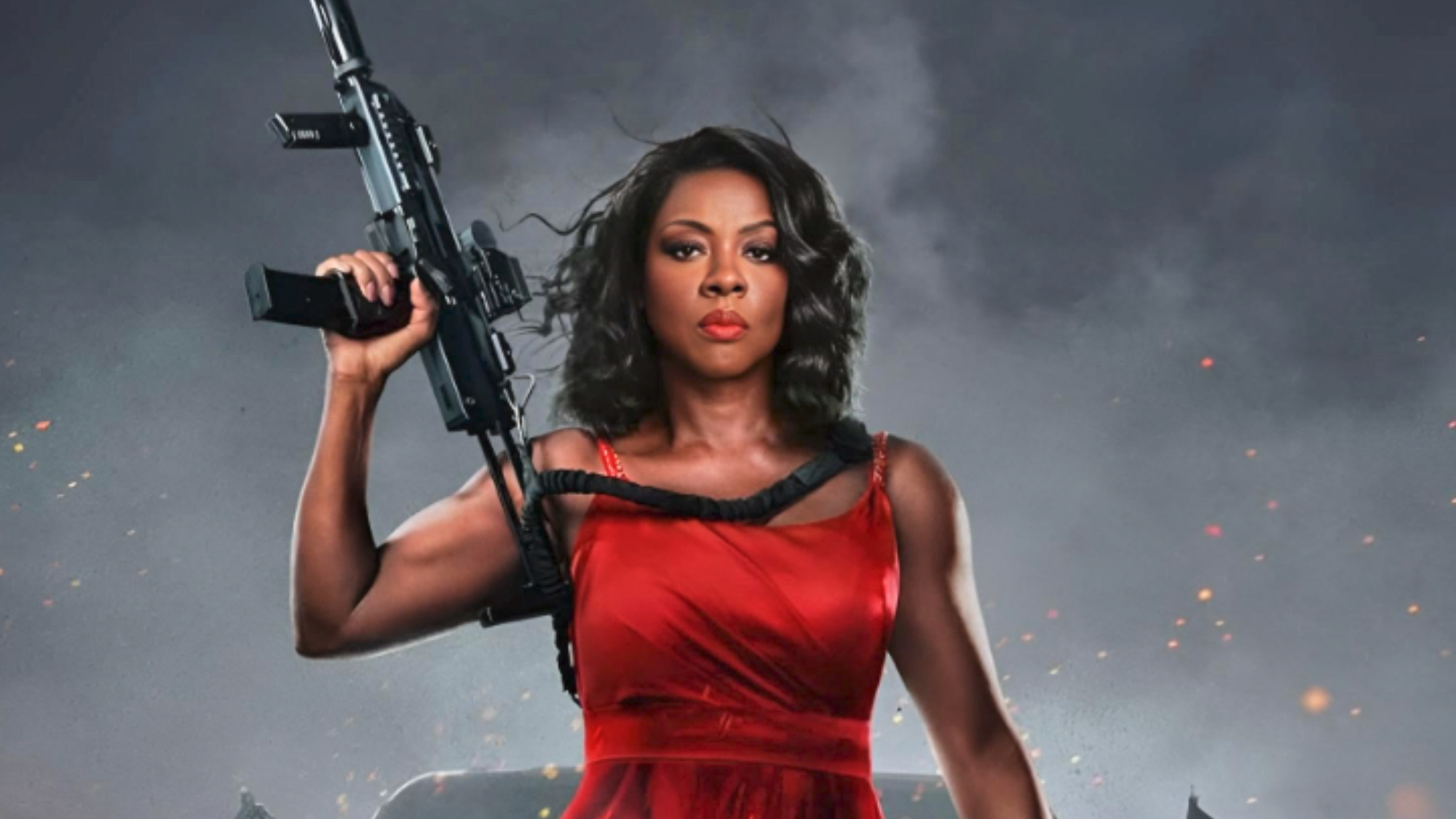Why Bill Clinton is a terrible political spouse
He's quite popular. And yet...


Hillary Clinton's favorability ratings are historically dreadful — and getting worse. Check this out:

Those numbers are abysmal. And they mean that Hillary Clinton is more unpopular than any presidential candidate in either party since 1984 (except for Donald Trump, of course).
So, faced with a skeptical electorate that dislikes her personally, what should Clinton do to improve her numbers? Well, she might try what other candidates have done in the past — and get her spouse to speak for her.
Subscribe to The Week
Escape your echo chamber. Get the facts behind the news, plus analysis from multiple perspectives.

Sign up for The Week's Free Newsletters
From our morning news briefing to a weekly Good News Newsletter, get the best of The Week delivered directly to your inbox.
From our morning news briefing to a weekly Good News Newsletter, get the best of The Week delivered directly to your inbox.
On first blush, it's an appealing strategy. After all, Bill Clinton remains very popular. And indeed, candidates' wives have traditionally been powerful surrogates who have been deployed to testify to a spouse's humanity, goodness, and general likability. In 2012, Mitt Romney was perceived as both venal and robotic, with 47 percent of the electorate viewing him unfavorably. Ann Romney, though, was viewed unfavorably by only 30 percent of the electorate. Predictably, the Romney campaign was eager to use her to bolster her husband, and gave her a high-profile speech at the Republican convention in which she talked about Romney as husband, father, and good egg.
Michelle Obama, for her part, was perceived positively by fully two-thirds of the 2012 electorate. During the campaign, Obama adviser David Axelrod described her as, "next to the president himself, and maybe including the president... our most in-demand surrogate."
Why are candidates' wives so much more popular than the candidates themselves? It's in large part because candidates' wives appear to be above the partisan fray. "First ladies can appear non-political," Denise M. Bostdorff, a communications professor at the College of Wooster, told The Week. "They're the nice person who's not really involved in politics, and people are expected to not really attack them for political positions." As a result, she said, they "are allowed to be a salesperson for the president. They can talk about all the wonderful things that he has done," without seeming like shills. Bostdorff pointed to Elizabeth Dole, who at the 1996 convention "walked out Oprah style among the audience members" to discuss, as Dole put it, "the man I love."
Elizabeth Dole was herself a seasoned politician; in 1996 she had already served in multiple Cabinet posts and she'd go on to become the first female senator from North Carolina. But she embraced a traditional role in the campaign, presenting herself as a non-political wife rather than as a partisan.
This is not something Bill Clinton has ever done, or is ever likely to be able to do. And this is why he's such a lousy political spouse.
Bill Clinton's approval ratings are in the high 50s, and he's been a vocal and active campaign surrogate. But he's never going to be anything other than a political figure, tightly bound in the public memory to his own presidency — as his tense exchange last month with a Black Lives Matter activist underlined. Bill can say that Hillary's policies are good; he can say she is dedicated and has the interests of the public at heart. But he can't say, as Ann Romney or Elizabeth Dole or Michelle Obama did, that "as a non-political figure, purely from a personal standpoint, I can tell you that my spouse is a good person." Bill can help Hillary in many ways. But his own political history prevents him from humanizing her in a non-political way.
But it's more than Bill's political history — it's his gender, too.
Politicians are supposed to be both tough and human, both unbendingly resolute and nice. For women, the demand to be simultaneously strong and compassionate can be especially difficult — not least because the way in which candidates generally broadcast their compassion is by having their (stereotypically female) spouses vouch for their hidden, lovable side.
In fact, many of the more bitter criticisms of Hillary are precisely that she has no personal self, that she is nothing but "political ambition in a pantsuit," as the conservative writer Jonah Goldberg charmingly put it. Men who want to be president point to their wives to show that there is more to them than political calculation. Clinton can't do that, both because of who her husband is, and because he's a man, and so can't immediately symbolize private life, love, and all the softer emotions which women are supposed to embody.
Hillary Clinton has been in public life for a long time, and there's a litany of good reasons to dislike her. Still, it seems likely that some part of Hillary's high negatives are due to the fact that her spouse, for all his skill on the trail, is the wrong gender to assure people that deep down, she's a good person.
Sign up for Today's Best Articles in your inbox
A free daily email with the biggest news stories of the day – and the best features from TheWeek.com
Noah Berlatsky is a freelance writer whose work appears in The New Republic, The Guardian, and other venues. He is the author of Wonder Woman: Bondage and Feminism from Rutgers University Press.
-
 G20: Viola Davis stars in 'ludicrous' but fun action thriller
G20: Viola Davis stars in 'ludicrous' but fun action thrillerThe Week Recommends The award-winning actress plays the 'swashbuckling American president' in this newly released Prime Video film
By The Week UK
-
 The Masters: Rory McIlroy finally banishes his demons
The Masters: Rory McIlroy finally banishes his demonsIn the Spotlight McIlroy's grand slam triumph will go down as 'one of the greatest and most courageous victories in the history of golf'
By The Week UK
-
 What is your net worth and why is it worth knowing?
What is your net worth and why is it worth knowing?the explainer Take stock of your assets
By Becca Stanek, The Week US
-
 The JFK files: the truth at last?
The JFK files: the truth at last?In The Spotlight More than 64,000 previously classified documents relating the 1963 assassination of John F. Kennedy have been released by the Trump administration
By The Week Staff
-
 'Seriously, not literally': how should the world take Donald Trump?
'Seriously, not literally': how should the world take Donald Trump?Today's big question White House rhetoric and reality look likely to become increasingly blurred
By Sorcha Bradley, The Week UK
-
 Will Trump's 'madman' strategy pay off?
Will Trump's 'madman' strategy pay off?Today's Big Question Incoming US president likes to seem unpredictable but, this time round, world leaders could be wise to his playbook
By Sorcha Bradley, The Week UK
-
 Democrats vs. Republicans: who are the billionaires backing?
Democrats vs. Republicans: who are the billionaires backing?The Explainer Younger tech titans join 'boys' club throwing money and support' behind President Trump, while older plutocrats quietly rebuke new administration
By Harriet Marsden, The Week UK
-
 US election: where things stand with one week to go
US election: where things stand with one week to goThe Explainer Harris' lead in the polls has been narrowing in Trump's favour, but her campaign remains 'cautiously optimistic'
By Harriet Marsden, The Week UK
-
 Is Trump okay?
Is Trump okay?Today's Big Question Former president's mental fitness and alleged cognitive decline firmly back in the spotlight after 'bizarre' town hall event
By Harriet Marsden, The Week UK
-
 The life and times of Kamala Harris
The life and times of Kamala HarrisThe Explainer The vice-president is narrowly leading the race to become the next US president. How did she get to where she is now?
By The Week UK
-
 Will 'weirdly civil' VP debate move dial in US election?
Will 'weirdly civil' VP debate move dial in US election?Today's Big Question 'Diametrically opposed' candidates showed 'a lot of commonality' on some issues, but offered competing visions for America's future and democracy
By Harriet Marsden, The Week UK